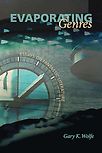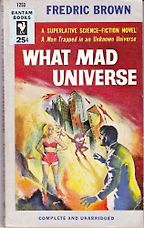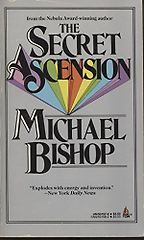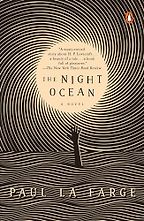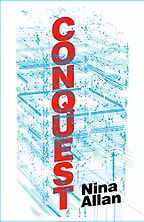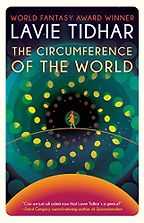Novels about science fiction have featured sci fi authors, sci fi editors, and—maybe above all—sci fi fans. What’s the appeal of this meta take on our sci fi reading habits?
I think one of the things that’s always fascinated me about science fiction is its fascination with itself. It’s been a community for something like 100 years. If you go back to the beginning of the pulp magazines, as early as the 1930s and 1940s, people knew the tropes of science fiction: they knew what space opera looked like, they knew what alien invasions were supposed to look like. And by the mid-1940s, writers had begun playing games with themselves and with fans. One writer named Wilson Tucker, who is credited with inventing the term ‘space opera’, offered to put friends of his in his stories as characters – and those are known in fandom today as Tuckerisations. So I think the interaction between fiction and the reader has always been much more complex and playful in science fiction than in most other genres.
Your first choice is an early example of this playfulness, featuring a sci fi editor. Could you introduce us to Fredric Brown’s What Mad Universe, written in 1949?
Fredric Brown was a fascinating writer who had a very successful career in mystery– and crime-writing, and as a science fiction writer. He had written some classic sci fi stories, and he was somebody who was selling stories during the 1940s to the pulp magazines, but who was all too aware of what these magazines’ shortcomings were, let’s say. What Mad Universe is a comic novel that deals with a pulp magazine editor who, through some bizarre accident of radiation – accidents of radiation could account for anything that happened in science fiction back then – ends up in one of the pulp universes that he edits stories for. And he finds that he is, in fact, living inside a science fiction pulp novel. As a result, the novel itself is a hilarious takedown of all the clichés that were common in science fiction at that time.
It’s a loving satire. I chose it partly because I think it may have had some influence on a later novel by Philip K. Dick, Eye in the Sky, in which another radiation accident throws a set of characters into each other’s interior minds. So the idea that the science fiction pulp universe is something that maybe exists out there has echoed through the decades. There’s even a William Gibson story called ‘The Gernsback Continuum,’ which is based on the idea that maybe those great pulp cover illustrations and pulp stories could exist somewhere.
This anticipates a question I had – were there many copy-cats, once this idea was out there?
It was unusual for the 1940s. To be honest, I don’t know how well received it was – because on the one hand, it’s a love letter to pulp science fiction; but on the other hand, readers at the time may have felt that they were being satirised and demeaned in some way. I’ve never really looked into that. But, as I say, the idea echoes, mostly in short stories after that; there are a number of writers who would do parodies of science fiction. Harry Harrison wrote the novels Bill, the Galactic Hero, and Star Smashers of the Galaxy Rangers. Those were clear parodies. But what Brown did, which was and still is unusual in novels, was to put characters inside the science fiction universe – not just writing a parody of classic science fiction.
Interesting that our hero here is a sci fi magazine editor, whereas your later choices feature novelists.
Right! Editors were the powers in science fiction back then. It’s an unusual genre in that the Hugo Award, the most famous science fiction award, is named after an editor. No other genre names its awards after editors! John W. Campbell was the most influential editor back then. They were the gatekeepers, the controllers of science fiction. I think Brown was a little frustrated in dealing with them, so wanted to give them a taste of their own medicine.
Your next choice features a novelist: it’s an homage to Philip K. Dick, who had recently died when it was written in 1987. Could you introduce us to The Secret Ascension by Michael Bishop?
Philip K. Dick is one of the influential science fiction writers of the 1950s and 1960s, among other writers; only later when they began making movies out of things like Do Androids Dream of Electric Sheep?, which became Blade Runner, did he become a cultural icon. Michael Bishop – who just died a few months ago himself, unfortunately – was one of the most thoughtful and humane writers. He’s written a number of classic novels, and he’d written essays about Philip K. Dick.
“Some writers believe sci fi could save the world if people took it seriously”
This one struck me as being particularly appropriate not only because Philip K. Dick appears in it as a kind of spiritual guide, but because it’s also an example of something that Dick himself did very well: an alternative history. In this particular case, it’s in the fourth or fifth term of the Nixon administration, and it’s a dystopian nightmare – which has echoes today that it probably didn’t even have at the time. The idea is that Philip K. Dick himself becomes the guiding figure for the main character, and recognises this world for what it is. It expands the notion of what you can do with recursive fiction, because you have a writer living in a dystopia, who is consulting with another writer who wrote famous dystopian fiction – the most famous one of Dick’s is The Man in the High Castle – and Bishop was well aware of that. He writes this book very much in the style and structure of Philip K Dick novels, which is a distinctive style and a distinctive, frankly paranoid, outlook on the world. But this is one of the things you think twice about while you’re reading the novel: is this paranoid, or is this maybe happening?
It’s interesting that sci fi here is on the side of liberalism – is that how sci fi sees itself?
I think science fiction, like any other kind of literature, aligns itself along the political spectrum – you can find very militaristic science fiction, for example. With Dick, there’s a libertarian streak, which cuts the pie in a different direction. Dick himself, I think, believed in the liberating value of science fiction – believed in it as a beacon of freedom. I could almost have chosen The Man in the High Castle itself for this list, because there’s a science fiction novel in that novel, which holds out a hope of liberation for the characters. So yes, there’s an idealistic vision that science fiction has had of itself. Some writers believe it could save the world if people took it seriously, if they paid attention to the awful warnings and the wonderful promises.
For your next choices we are going to jump forward a few decades, to contemporary fiction. Sci fi has changed a great deal in the meantime – you write about the evolution of the genre in your essay collection, Evaporating Genres. When we write about sci fi today, are we still writing about the same thing as these earlier novelists?
Good question! To some extent, yes, the same thing persists. I’ve always thought that science fiction evolves by accretion rather than evolution. In other words, the pulp stories – or even going back before the classic pulp stories, to Edgar Rice Burroughs, H. G. Wells – those are all always part of the core of science fiction. Then you add space opera to that – you add the gigantic, large scale galactic empires – and that remains part of it. And then in the 1940s, you get a more realistic technological future, the kind of thing that Robert A. Heinlein wrote about… My point is that all of these layers of the history of science fiction are there for exploiting by contemporary writers. So you have writers who are fascinated by the space opera, and you have writers who are fascinated by earlier writers – who are enormously influential, even though some are now problematic in all sorts of ways.
One of the reasons I put my next choice on the list is because it considers H. P. Lovecraft – who was a well-known horror writer, and only wrote some science fiction, and some fiction that you could argue may or may not be science fiction… but he was a very active horror writer. He was also a vicious racist and anti-Semite, and a bizarre character in all sorts of ways. And over the last 10 years or so, there has been a movement among writers who recognise the problems with Lovecraft, but also recognise that there is a power to that kind of cosmic horror. So you have, for example, Victor LaValle, a very successful writer now who’s making the best-seller list, writing a novella – The Ballad of Black Tom – which is a rewriting of an earlier Lovecraft story, with a black protagonist. It’s kind of in-your-face, but he’s trying to get at the effect of Lovecraft while including black characters. Another writer, Kij Johnson, has written The Dream-Quest of Vellitt Boe – again, a rewriting of a Lovecraft story, this time recognising women and feminism. In other words, using Lovecraft against himself, while pointing out to the reader that the power of this kind of fiction is real.
And Lovecraft is in your next choice: Paul LaFarge’s 2017 novel The Night Ocean.
Yes – which actually predates some of those others I mentioned. LaFarge is the only writer on the list who’s not really a science fiction or fantasy writer. I learned after turning in this list that he died a few weeks ago. He had written for The New Yorker, had written some mainstream literary fiction, and he was clearly fascinated by the history of Lovecraft. This novel is largely about Lovecraft, and the possibility of his secret gay love life with a man in Florida: but the investigation into this question leads LaFarge into all parts of the history of science fiction and pulp magazine. So everybody from Isaac Asimov to Frederik Pohl to Donald Wollheim, all show up as characters. There’s even a teenage Ursula Le Guin, who we meet as the daughter of a pair of anthropologists at Berkeley. So he’s clearly having a lot of fun with a whole history of the genre, and at the same time, rediscovering and possibly undermining not only Lovecraft, but a lot of the pulp traditions that he was fascinated with. It demonstrates that somebody who doesn’t, as far as I know, come from the science fiction community can be equally fascinated by all these characters and larger-than-life figures that inhabited it for 30 or 40 years.
The plot almost begins as a mystery, with a woman whose husband seems increasingly obsessed with finding out what happened to Lovecraft. And there’s one incident, which I gather is historically real: Lovecraft, who famously never left Providence, Rhode Island where he grew up – he was married for a while, but he lived basically with his aunts – for some time, for some reason, he spent a couple of weeks in Florida with this young fan named R. H. Barlow. And no one knows what happened there. There’s no record at all. So the beginning of the novel is the husband, obsessively trying to track down evidence of what happened, which leads him into a mystery investigation, which in turn leads to all these stories within stories within stories of pulp fiction.
There’s not really any Lovecraftian Horror – and that’s the other thing, it’s not really a science fiction novel. It’s not a supernatural novel, except that it may be a kind of alternate history – maybe these characters, who didn’t really encounter each other, did in this novel. It’s clearly somebody having a lot of fun, but keeping everything strictly aligned with this mystery investigation plot. So it’s a compelling book to read, even if you’re not fascinated by Lovecraft and the others.
Your next choice is a mystery too, and perhaps one a little closer to home today – we’re tracking down a missing alien conspiracy theorist here. Could you introduce us to Nina Allan’s Conquest?
I think Nina Allan is one of the most interesting novelists working in the UK right now, and has been for some time. A lot of her fiction has a self-reflective quality. There’s a collection of short stories of hers, where the stories double back on themselves in all kinds of complicated ways – and when you finished, you’re left thinking, is that a novel? Did all those loose things tie together?
Conquest is her most recent novel, and it deals with a lot of cultural baggage. The main characters are obsessed with Bach, they’re fascinated by German Romantic painting. But at the centre of the novel is an obscure 1950s science fiction novel, which may or may not be some kind of documentation of an actual alien invasion. Again, it begins as a mystery, as you mentioned: somebody’s invited to go to Paris, and they promptly disappear. What happened to them? Trying to track them down, again, leads into these unfolding conspiracies, and all of it’s surrounding a mysterious novella – which she then gives us in the middle of the novel. And then you’re asking yourself – is this supposed to be a parody of 1950s science fiction? Is it metafiction? Is it some critical argument about the nature of science fiction? And are we supposed to admire this story? Because it’s not a very good story, actually! But then the characters tell us, no, it’s not a good story. In fact, it may never have been published at all, because nobody can find a copy of it.
It gets more and more complicated, and less and less complicated at the same time, which is one of the things I think that Nina Allan does beautifully: the more convoluted the story becomes, the more it begins to coalesce into something that you can see was clearly planned all along. It’s a brilliantly structured novel, I think.
Is this another novel where the role of sci fi is admirable?
I don’t think it’s meant to admire science fiction or to critique it. I think it’s a novel that explores the uses of science fiction: What does science fiction do to its readers? What does science fiction say about the culture? What is the position of science fiction as a mode of imagining, not just as a genre of literature? So to some extent, it’s making fun of the fact that there is a lot of amateur fiction out there – a lot of fiction that’s apocryphal, for example. But it’s also asking the question, what does this kind of imagination do to people? I think that’s a question that comes up again and again in fiction about science fiction: what does it do to us? What does it mean, for its readers? How many people have invested their own fate in what they think science fiction has to tell them?
Is there any work on these questions in literary criticism, or psychology?
Oh, that’s a good question! There’s probably a fair amount of criticism and scholarship, most recently from Brian Attebery, which deals with the uses of fantasy, and how fantasy has long been a kind of escape valve – going back to the Victorian era, where you had this explosion of fantasy, almost as a counteraction to the explosion of realistic fiction: the Hardys and Dickenses and so on. I’m not sure that science fiction criticism is quite focused on that yet. There is a lot of criticism about the structure and history of science fiction, but it’s not had the same kind of attention that fantasy has had, in terms of the psychological.
That’s very interesting to me, because it seems likely that sci fi is often working on our minds in a similar way to fantasy.
Yes. One of the arguments I made in Evaporating Genres is that there’s an increasingly blurry line between science fiction and fantasy. There’s an argument going on online right now – in fact, it’s always going on online – about whether Star Wars is science fiction or fantasy. It has some of the appurtenances and things that look like science fiction: it has lightsabers and death rays and spaceships. But the plot is a fantasy story, and the central ‘force’ is a magical force.
Increasingly, there are writers who will combine elements of horror and elements of fantasy: there’ll be witches and warlocks in spaceships, there’ll be lesbian vampires in space. But there is still the idea that these are distinct genres with distinct rules and distinct barriers, which some people believe. Some people really want to say, okay, there is the line of the impossible, and you cannot cross it and still be science fiction. You cannot have, for example, vampires and werewolves in a science fiction story. On the other hand, you have people saying, why not? So now you have novels, which mix all of these genres together freely and aren’t concerned at all about genre barriers.
I love your phrase, the matter of science fiction is the ‘geography of reason’…
… and fantasy became the ‘geography of desire’, which I think I may have borrowed from somebody like H. Rider Haggard. By and large, yes, these are emotions – these are not necessarily literary rules. I think one of the things that science fiction does is bridge the realistic and fantastic.
One of the things that made fantasy such a lively genre in the 19th century was that it had hard bitten realism to play off against. Hardy and Dickens and Eliot were writing one kind of fiction – and Eliot, in fact, wrote a flat out attack on fantasy writing in one of her novels, Adam Bede. She says, it’s easy to draw a griffin, with large claws and huge wings, but it’s much more difficult to draw a picture of an ordinary lion. And she had written essays too, probably under a pseudonym, in which she viewed fantasy as a more primitive form of storytelling – going back to the romantics, to Sir Walter Scott, and before that to the Gothic novel. It was a kind of Whig history of fiction: the idea that what had been done now with the Victorian novel is what all literature has aspired to, from the beginning.
You could make an argument that science fiction eventually evolved as a blending of the realistic and the fantastic. You can almost see that happening in one of the earliest examples, in Frankenstein. Frankenstein has elements of realism in it. It certainly takes place in real locations, and it has some real science in it, at least according to the beliefs of the time. And yet, it’s a wild Gothic fantasy in another sense. And there’s a debate that’s been going on for decades now, as to whether that’s the first science fiction novel, or simply a Gothic novel that uses a bit of science.
We’ve come now to your final choice, which only came out in 2023: The Circumference of the World, by Lavie Tidhar.
Tidhar is an Israeli-born writer, who’s very open about his experience as a science fiction fan from childhood: his experience growing up in a kibbutz, and his experiences in the literary communities of London, where he lives now. So all this informs his fiction, which has always cheerfully alluded to earlier traditions of science fiction. He has an eclectic collection of stories called Central Station, which are set around a giant future Spaceport in Tel Aviv, and there are figures in it who take their names from earlier novels and stories by well-known science fiction writers. There’s a sort of vampire-like figure called Shambleau, a name borrowed from a pulp story by C. L. Moore back in the 1930s. These allusions were easter eggs for science fiction readers; they weren’t critical to the plots of these stories.
When we get to The Circumference of the World, though, he’s really writing a novel that’s partly about a fictional science fiction novel, but largely about the whole culture of science fiction; and he takes it on in a more direct way than he has before, using real names, real characters. The only thing he backs away from a little bit, probably for all kinds of legal reasons, is that there’s clearly a Scientology cult involved, and the figure is clearly based on L. Ron Hubbard, but he’s not called that! Other characters – John W. Campbell, Isaac Asimov, for example – show up in the novel itself, sometimes as correspondents with somebody else, sometimes there are documents within the story. Tidhar’s clearly familiar with that period of science fiction history – which has been, I should mention, very well documented by Alec Nevala-Lee in a book called Astounding, which is a kind of joint biography of John W. Campbell, Isaac Asimov, Robert A. Heinlein, and L. Ron Hubbard, all of whom interacted in interesting, different ways.
One of the things that comes across in Tidhar’s novel is the contradiction between science fiction’s attraction to hyper-rationalistic ideas of the future on the one hand, and completely off the wall insane ideas involving psychic powers and alien civilizations and so forth on the other. It comes across in this novel, as well as in Alec Nevala-Lee’s book, that Campbell – who was probably the most influential editor in the history of science fiction magazines – was on the one hand, very insistent that writers like Asimov and Heinlein adhere to what is known science and what is possible with technology; but on the other hand, very fond of writers like A. E. Van Vogt and L. Ron Hubbard, who wrote completely crazy fantasies of power, mind control and telepathy. Campbell himself was fascinated with ideas of telepathy and mental powers, what they called psi powers. So that kind of contradiction is one of the things at work in The Circumference of The World.
As for the plot: a brilliant mathematician remembers an obscure 1962 science fiction novel she read as a child, and her boyfriend disappears trying to track down a copy. And the investigation leads, like any good private eye investigation, to layer upon layer of further mysteries and further puzzles, involving everything from Russian mobsters to real-life pub meetings of London science fiction writers. As an investigative mystery, I think it’s pretty successful in its own right. And it can be read by somebody who, again, has very little or no interest in science fiction. In fact, I’m not sure I would even call The Circumference of the World a science fiction story, except for the question of whether some of the science fiction in the stories within stories might turn out to be real.
When I read this and reviewed it, I thought other science fiction readers – people who at least know something of the history of science fiction – were going to think it was a hoot. It’s going to be one in-joke after another. But one question is, how well does he succeed in making these characters real for people who don’t know who they are? To what extent is the whole novel appealing only to the science fiction fans? My sense is that his sketches of these characters are strong enough to make them understandable as peripheral characters to the central story; and the central story I think, has its own power.
I imagine this issue must come up fairly often when reviewing science fiction. Even when it’s not explicit, science fiction novels are so often in conversation with each other.
There’s definitely a conversation going on. And one of the things that’s fascinating to me is that there are clearly science fiction stories by people outside the genre, who are fascinated by it; and some of them are in dialogue, some of them are not. For example, Margaret Atwood was very clear when The Handmaid’s Tale first came out that this was not to be thought of as science fiction, or to be thought of as in dialogue with science fiction, even though it really was. At the opposite end of the spectrum was Doris Lessing, who when she began writing science fiction knew perfectly well what she was doing. She had grown up reading a fair amount of science fiction, and her Canopus in Argos and all those things were meant to be in dialogue with earlier science fiction. She was friends with people like Brian Aldiss, she had read writers like Olaf Stapledon. So for mainstream writers, the choice is there: whether to make this novel or story in dialogue with science fiction, and writers within the genre, or to ignore the history of the genre – but they’re going to get compared to it anyway. They’re more or less trapped in the dialogue.
Let’s take the idea of a generation spaceship, which is one of the undying clichés of science fiction—a spaceship journey so long that it takes generations to complete, with an entire society evolving onboard. You can’t write a generation spaceship story now without some readers comparing it to 20 other stories in the past. On the other hand, you can take the old idea and repurpose it to explore a variety of new issues, from income or gender inequality to colonialism.
Is sci fi the only genre so fascinated with itself?
No, I suppose science fiction isn’t the only genre that writes about itself. I’ve read a handful of murder mysteries that are about mystery writers, for example. And I strongly suspect there are a number of romance novels about romance novel writers. There clearly is a tradition of horror stories about other horror stories, with figures like Poe and Lovecraft showing up as characters on a fairly regular basis. And for that matter, think of how many literary novels are about novelists! So I don’t think this self-recursiveness is something that’s invented by or confined to science fiction. But science fiction writers and readers seem to view it as a way of both celebrating and validating the genre’s past. A reader who understands the allusion can feel a part of a community of similar-minded readers, or at least feel that they are in on the joke. But if the novel succeeds on its own terms, none of that should be essential to enjoying it.
Interview by Sylvia Bishop
February 24, 2024. Updated: March 11, 2025
Five Books aims to keep its book recommendations and interviews up to date. If you are the interviewee and would like to update your choice of books (or even just what you say about them) please email us at [email protected]
Five Books interviews are expensive to produce. If you've enjoyed this interview, please support us by donating a small amount.

